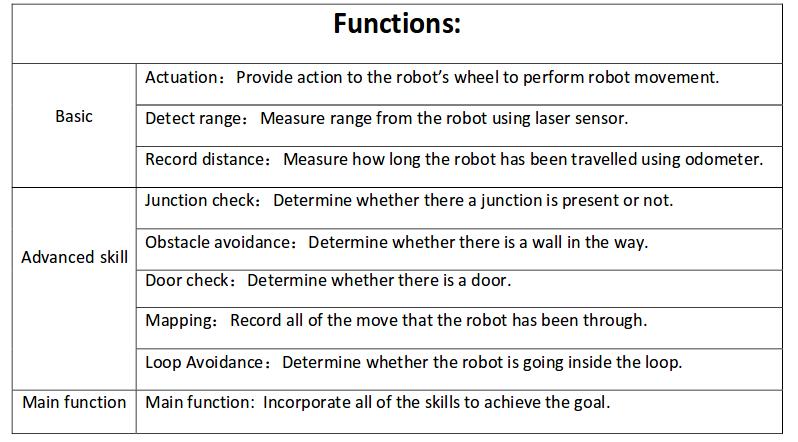Embedded Motion Control 2017 Group 9: Difference between revisions
| Line 78: | Line 78: | ||
=== Specifications === | === Specifications === | ||
- maximum translational speed of 0.5 m/s | |||
‐ maximum rotational speed of 1.2 rad/s | |||
‐ Door template: length of 0.5 ‐ 1.5m and with side walls of approximately 30cm, see figure below | |||
‐ LRF accuracy and range unknown | |||
‐ odometer accuracy unknown | |||
=== Interfaces === | === Interfaces === | ||
Revision as of 19:15, 15 May 2017
Group Members
| Name: | Student id: |
| Mian Wei | X |
| Zhihao Wu | X |
| Petrus Teguh Handoko | X |
| Bo Deng | X |
| Bo Cong | X |
| Jian Wen Kok | X |
| Nico Huebel | Tutor |
Initial Design
Requirements
➢ PICO drives autonomously through maze
➢ PICO should find the exit and the whole robot is across the finish line within 5 minutes.
➢ PICO is able to deal with approximately axis‐aligned walls, open spaces and loops in the maze.
➢ The task has to be finished within 2 attempts in 7 minutes.
➢ PICO should not stand still for 30 seconds which counts as an attempt
➢ PICO may not touch the wall
➢ The whole PICO should stop within 1.3m to a dead end, and detect whether the dead end is a door.
➢ PICO should detect every dead it meet
➢ At the exit PICO should drive forward for 40 cm
➢ The software is easy to set‐up
Functions
Components
drive control
‐Holonomic base (omni‐wheels)
‐Pan‐tilt unit for head
detection
‐170◦ wide‐angle camer
‐Laser Range Finder (LRF)
‐Wheel encoders (odometry)
‐Asus Xtion Depth sensor
world model
computer
‐Intel I7
‐Ubuntu 14.04
Specifications
- maximum translational speed of 0.5 m/s ‐ maximum rotational speed of 1.2 rad/s ‐ Door template: length of 0.5 ‐ 1.5m and with side walls of approximately 30cm, see figure below ‐ LRF accuracy and range unknown ‐ odometer accuracy unknown
Interfaces
The odometer and LRF generates data for mapping the environment.
The algorithm sets nodes on the junction as a setpoint for navigation, plans the route and put the actuators to work accordingly.
The odometer and LRF keeps on keeping track of the environment and the software recognizes obstructions, dead ends that might be doors and junction.
